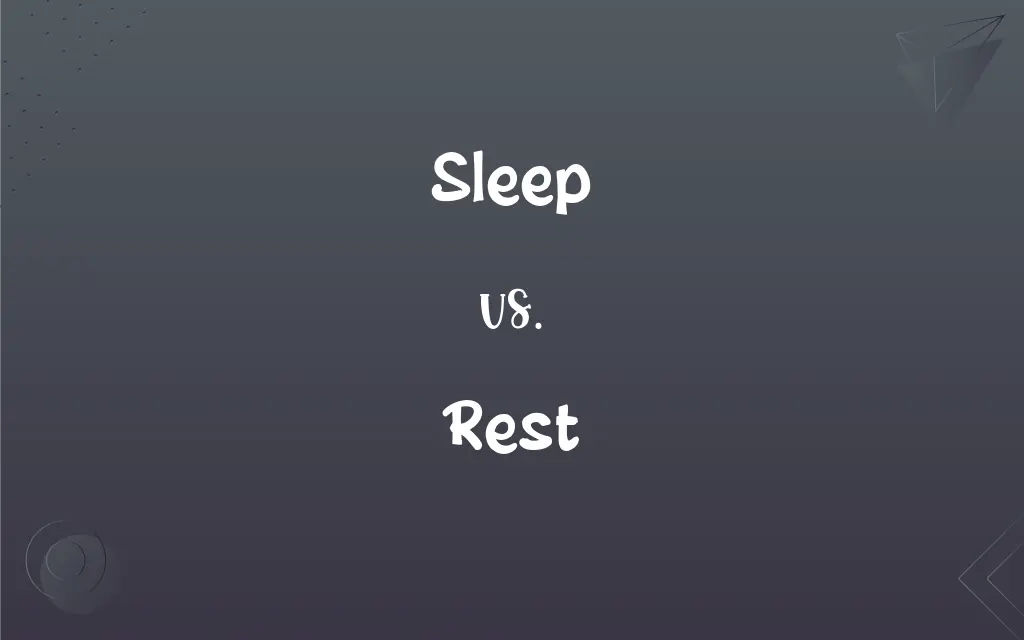Sleep vs. Rest: What's the Difference?
Edited by Aimie Carlson || By Harlon Moss || Published on January 18, 2024
Sleep is a state of unconsciousness where the body is inactive and the mind is detached from sensory inputs, while rest is a state of relaxation and reduced activity or exertion, not necessarily involving sleep.

Key Differences
Sleep is a biological necessity characterized by a state of unconsciousness, where the body undergoes restoration and repair. Rest, on the other hand, is broader, encompassing any relaxing activity that reduces stress and fatigue without necessarily leading to unconsciousness. Both are essential for maintaining physical and mental health, yet they function differently.
During sleep, the brain processes information and consolidates memories, a critical function for cognitive health. Rest, in contrast, can involve light activities like reading or meditation, which do not engage the brain in the same intense processing. Sleep is a specific, vital form of rest, but rest itself can be achieved without sleeping.
Sleep typically requires specific conditions like a comfortable environment and a state of physical inactivity. Rest, however, can be achieved in a variety of settings and doesn't always require complete inactivity. For instance, one might feel rested after a leisurely walk, which wouldn't qualify as sleep.
The health benefits of sleep are well-documented, including its role in immune function, metabolism, and emotional well-being. While rest also contributes to these areas, it does so more indirectly, often by reducing stress and providing a break from daily strains, rather than through the physiological processes that occur during sleep.
Sleep disorders can significantly impact health, indicating the essential nature of quality sleep. Rest-related issues, while less studied, can also lead to problems like chronic fatigue or burnout. Both sleep and rest are critical, and a deficit in either can lead to negative health outcomes.
ADVERTISEMENT
Comparison Chart
State
Unconsciousness
Conscious relaxation
Physical Activity
Minimal to none
Can involve light activities
Duration
Typically longer, structured (hours)
Variable, often shorter
Biological Need
Essential for survival
Important for well-being, not survival-critical
Mental Processing
Intense (dreaming, memory consolidation)
Minimal to moderate
ADVERTISEMENT
Sleep and Rest Definitions
Sleep
A condition of body and mind such as that which typically recurs for several hours every night.
Babies need more sleep than adults.
Rest
The remaining part of something.
I spent the rest of the day reading.
Sleep
A natural periodic state of rest for the mind and body.
She fell into a deep sleep after a long day of work.
Rest
Cease work or movement in order to relax, refresh oneself, or recover strength.
He needed to rest after the marathon.
Sleep
The resting state in which the body is not active and the mind is unconscious.
During sleep, our bodies repair themselves.
Rest
An instance or period of relaxing or ceasing to engage in strenuous or stressful activity.
The vacation was a much-needed rest.
Sleep
A state characterized by altered consciousness, relatively inhibited sensory activity.
He was in a deep sleep, unaware of the noises around him.
Rest
Be placed or supported so as to stay in a specified position.
Her hand rested on the chair's arm.
Sleep
A state of inactivity, with the suspension of sensory and voluntary activity.
On weekends, I indulge in extra sleep to recover from the week.
Rest
Peace, ease, or refreshment resulting from sleep or the cessation of an activity.
A day of rest helped her rejuvenate.
Sleep
A natural periodic state of rest for the mind and body, in which the eyes usually close and consciousness is completely or partially lost, so that there is a decrease in bodily movement and responsiveness to external stimuli. During sleep the brain in humans and other mammals undergoes a characteristic cycle of brain-wave activity that includes intervals of dreaming.
Rest
A period of inactivity, relaxation, or sleep:The hikers stopped for a rest.
Sleep
A period of this form of rest.
Rest
Sleep or the refreshment resulting from inactivity or sleep:Get plenty of rest before the race.
FAQs
What is sleep?
Sleep is a natural state of rest where the body is inactive and the mind is unconscious.
Can rest replace sleep?
No, rest can't replace the physiological processes that occur during sleep.
What are the benefits of sleep?
Benefits include memory consolidation, emotional regulation, and physical restoration.
Can you get too much sleep?
Yes, excessive sleep can be indicative of underlying health issues.
What is rest?
Rest is a state of relaxation where activities are reduced or stopped to recover strength and reduce stress.
Is napping considered sleep or rest?
Napping is a form of sleep, as it involves a state of unconsciousness.
What are signs of inadequate rest?
Signs include feeling tired, irritable, or having difficulty concentrating.
How much sleep is necessary?
Adults typically need 7-9 hours of sleep per night, but it varies by individual.
What are the benefits of rest?
Rest reduces stress, improves mood, and can enhance overall well-being.
Can you rest without sleeping?
Yes, rest can be achieved through relaxing activities without sleeping.
What happens during sleep?
The body undergoes restoration, and the brain processes information and consolidates memories.
What constitutes good rest?
Good rest involves any activity that reduces stress and feels rejuvenating, like reading or meditating.
Can exercise improve rest?
Yes, regular exercise can improve the quality of both sleep and rest.
Can lack of sleep affect health?
Yes, sleep deprivation can lead to various health issues, including cognitive impairments and mood disorders.
Is resting the same as being lazy?
No, resting is an important activity for health and well-being, unlike laziness which implies unwillingness to work or be active.
What are sleep disorders?
Sleep disorders are conditions that disrupt normal sleep patterns, like insomnia or sleep apnea.
Do older adults need less sleep?
Older adults may experience changes in sleep patterns, but their need for sleep remains similar.
Can meditation help with rest?
Yes, meditation is an effective way to achieve mental rest and reduce stress.
How can I improve my sleep quality?
Practices include maintaining a regular sleep schedule, creating a comfortable sleep environment, and avoiding caffeine before bedtime.
Is it okay to rest during work?
Short breaks for rest can improve productivity and mental clarity.
About Author
Written by
Harlon MossHarlon is a seasoned quality moderator and accomplished content writer for Difference Wiki. An alumnus of the prestigious University of California, he earned his degree in Computer Science. Leveraging his academic background, Harlon brings a meticulous and informed perspective to his work, ensuring content accuracy and excellence.
Edited by
Aimie CarlsonAimie Carlson, holding a master's degree in English literature, is a fervent English language enthusiast. She lends her writing talents to Difference Wiki, a prominent website that specializes in comparisons, offering readers insightful analyses that both captivate and inform.






































































